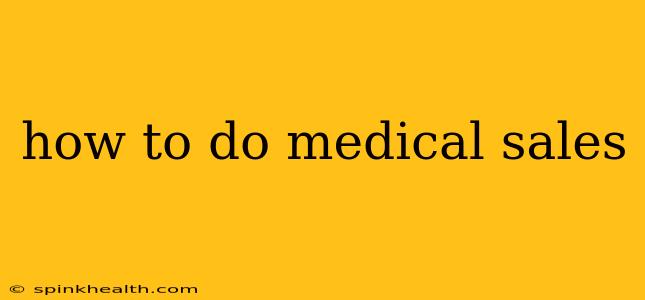How to Conquer the World of Medical Sales: A Journey of Expertise and Empathy
The world of medical sales isn't for the faint of heart. It's a demanding field requiring a unique blend of scientific knowledge, persuasive communication, and genuine empathy. This isn't just about selling products; it's about building relationships, understanding complex medical needs, and ultimately improving patient care. This journey will take you through the key steps to mastering this challenging and rewarding career.
What are the key skills needed for a career in medical sales?
Success in medical sales hinges on a potent combination of hard and soft skills. On the hard skills side, a strong scientific foundation is crucial. Understanding medical terminology, the intricacies of disease states, and the mechanisms of action of various pharmaceuticals or medical devices is paramount. Beyond that, strong analytical skills are necessary for interpreting data, understanding market trends, and crafting compelling presentations. Finally, proficiency in CRM software and sales methodologies is essential for efficient lead management and sales cycle optimization.
However, the soft skills are equally, if not more, important. This includes exceptional communication skills—both written and verbal—to effectively convey complex information to diverse audiences, including doctors, nurses, hospital administrators, and sometimes, even patients. Active listening is critical for understanding the specific needs of your clients and tailoring your approach accordingly. Building rapport and trust is fundamental, as medical professionals often prefer to work with representatives they know and respect. Finally, resilience and persistence are key; rejection is part of the process, and the ability to learn from setbacks is crucial for long-term success.
What is the typical day-to-day work like in medical sales?
A day in the life of a medical sales representative is rarely predictable, a testament to the dynamism of the industry. It could begin with reviewing sales data, identifying key performance indicators (KPIs), and strategizing for the day ahead. Then, you might spend hours visiting doctors' offices, hospitals, or clinics, presenting your products or services, answering questions, and addressing concerns. This requires meticulous preparation, understanding your audience, and having a deep understanding of the competitive landscape. You’ll likely spend time networking with key opinion leaders (KOLs), attending industry conferences, and participating in continuing education to stay abreast of the latest advancements. Record-keeping, preparing reports, and managing your sales pipeline are also integral parts of the job. Expect long hours, travel, and a need to be constantly adaptable.
What kind of education or experience is needed to work in medical sales?
While a science background (biology, chemistry, pre-med) is often preferred, it's not always strictly required. However, a proven track record in sales and a genuine passion for the medical field are crucial. Many medical sales representatives have a bachelor's degree in a relevant scientific field, while some companies will accept strong candidates with other backgrounds coupled with significant experience in sales. Prior experience in healthcare, customer service, or sales roles can greatly enhance your prospects.
How do I break into medical sales with no experience?
Breaking into medical sales without direct experience can seem daunting, but it's definitely achievable. Start by building a solid foundation in relevant areas. Take online courses to bolster your understanding of medical terminology, diseases, and pharmaceuticals. Develop your sales skills through workshops or online training programs. Seek out entry-level positions in related fields, such as pharmaceutical or medical device companies, even if it's in a non-sales role. This allows you to gain industry knowledge and network with professionals who can mentor you. Highlight transferable skills from your previous experiences, such as strong communication, problem-solving, and interpersonal skills.
What is the salary and career growth potential in medical sales?
The salary potential in medical sales is quite competitive, often exceeding that of many other sales roles. The specific compensation will vary depending on factors such as experience, company, location, and the product or service being sold. Additionally, many medical sales roles offer lucrative commission structures, which can significantly increase earnings based on performance. Career growth potential is strong, with opportunities to advance to senior sales roles, regional manager positions, or even into marketing or management. Continuous professional development and staying current with industry trends are vital for maximizing your career progression.
This journey into medical sales requires dedication, resilience, and a commitment to continuous learning. But by honing your skills, building your network, and embracing the challenges, you can unlock a rewarding career that makes a tangible difference in the lives of patients and healthcare professionals.

